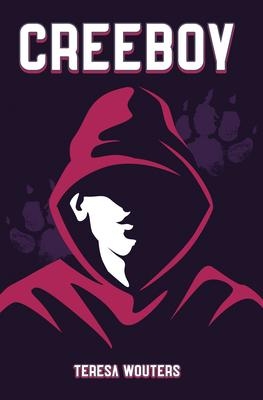Creeboy

Author: Teresa Wouters
Publisher: James Lorimer & Co.
On a fictional reservation, 16-year-old Josh “Creeboy” navigates the world of Indigenous gang life. His family members are no strangers to gangs. His dad, the leader of one on his reservation, is in jail, and his older brother Darion has taken his father’s place. Josh is unsure whether gang life is for him. But angry, hurt and frustrated by systemic racism against Indigenous peoples, Josh, now known as Creeboy, starts down the path to becoming a full gang member.
Can his family, and his community, save Josh before his fate becomes that of his father and brother?
Only rarely does a novel offer an inside look at gang life – not only its tension and violence, but its appeal.
Razor looked over the gang and said, “We are Warriors. The best gang for life. You know what it is. Show me your signs.” Some raised shirts and pointed to a W tattoo on the left of their chests. Others pointed to scars from stab and bullet wounds like honor badges.
It’s even less common that someone shines a light on the darker aspects of reservation life. In both these respects, Creeboy is a valuable contribution to young adult fiction, even if the writing quality is uneven.
Josh has dropped out of high school but is torn about taking the final steps to joining a local gang. That makes him real, believable and vulnerable. It also makes us, the reader, care.
To be honest, hanging out, getting deaf on blaring gangsta rap while stoned or drunk was boring as hell. Everyone here’s so bored, and angry, and hopeless, that any little bit of drama could hype them up. But I’m not going to tell anyone that. I’m going to carry on with Dad’s dream. Using the gang to make enough money to buy us all a big-assed house somewhere far away [from] here. Live like the rich because we’ll be swimming in money.
Creeboy’s shrill mother and concerned sister see the imminent danger of the path he’s on, but have less influence on him than the power, status and potential money he dreams of having. And yet, we see both sides of him and feel the tug-of-war. Scenes go from showing the joy of pushing his younger siblings on a swing set, and the pride of dancing in a pow wow, to the admiration he has for his older brother and the allure of being a Warrior.
Written in first-person past tense, and relying heavily on dialogue, unfortunately the book has awkward tense changes and some lame metaphors. Also, unclear writing. One example: “He got his name for smacking his dad around after beating up his mom.” It took me awhile to translate that to, “He got his name for smacking his dad around after his dad beat up his mom.”
Where the book shines, however, is in its portrayal of cultural activities (pow wow dancing, a sweat lodge and wake, respect for the elders) and its depiction of a community and family being torn apart. The writing is especially strong in its unvarnished descriptions of racism and the gang’s quarters.
The sound of gravel crunching under the tires could barely be heard over the wup-wup bass sound of rap coming from the crib. Its walls covered in graffiti. Four Warriors stood guard in front of the house. A group wrestled in tall, yellow grass. They greeted us as we passed through the door. The stench of cigarettes, pot and booze filled my nostrils as the music deafened me. In the smoky din, as Warriors greeted Razor, I looked around. The graffitied walls included holes from fists and kicks. Three girls slumped on worn out sofas. They held bottles and cans in their hands, crossed their legs, and yapped at each other. About a dozen guys lingered and huddled in clusters around the room, showing off tattoos and scars from fights.
Brakes squealed as [another semi] slowed down when it saw me and Razor sitting in a pool of blood. He stopped and talked to the other semi driver just long enough to find out what was going on, and then he drove off. Like we were nothing. Like we were just roadkill in the ditch.
This novel is an important read for a better understanding of gang power and life in an Indigenous community plagued by poverty and a lack of opportunities.
- Pam Withers

